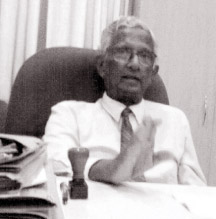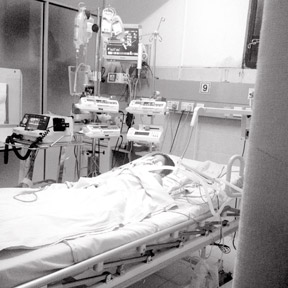|
Many private medical institutes yet to be registered:
Patients die despite stringent laws
By Manjula Fernando
It is no exaggeration that almost every person in Sri Lanka has at
least once in a lifetime been intimidated and swindled at private
medical institutions. This is to say the least. All major private
hospitals in the country, have a merry time minting money and making an
entire nation sick rather than cure, with little or no regulation, or a
responsible authority, to discipline them and protect patients' rights.
|

Dr. N.J. Nonis |
Although it has been repeatedly said that Sri Lanka lacks proper law
and a body to supervise and regulate the functions of the private
medical institutions, a close scrutiny of the Private Medical
Institutions (Registration) Act No. 21 of 2006 gives a different story
altogether. The laws indeed have been there all along, to be precise,
since July 14, 2006.
The laws to punish, take the faltering institutions to Court and
ultimately fine and if that is not enough, close down the miscreant
institution are already there, but amazingly it has not been put to
proper use. Why? is the pertinent question that we need to ask the
authorities. The provisions in the Act have allegedly never been
exercised to take legal action against private hospitals ever since it
was passed in Parliament. The Act has given birth to a Private Health
Services Regulatory Council to exercise, perform and discharge its
powers, duties and functions under this Act.
The Objectives of the Council as stipulated in the Act include, the
development and monitoring of standards, ensure minimum qualifications
for recruitment and minimum standards of training of personnel and
ensure the quality of patient care services rendered or provided. The
Act says the Council is empowered to discharge an authorised officer
'without prior notice, at any time by day or night, to enter any Private
Medical Institution, or any premises appertaining thereto, and do all
such acts as may be reasonably necessary for the purpose of carrying out
any inspection, examination, investigation or survey, for the purposes
of the Act'.
The law says any obstruction to this authorised inspecting officer is
a 'punishable offence'. Under the Act, it has also been clearly stated
that any person or body of persons who contravenes or fails to comply
with these provisions can be convicted in a summary trial before a
Magistrate. In such an event the case the convict will be liable to pay
a fine not exceeding fifty thousand rupees if 'such offence involves the
causing of injury to human life or seriously jeopardising public health
or public safety'. For other offences the fine ranges from Rs. 20,000 to
1,000. If the fine meets present day requirements is a matter to be
reviewed but most importantly, it has been clearly stipulated that a
second conviction on similar offence allows the Magistrate to 'outright
cancel the permit issued' to the convicted person or persons. [Section
16 (2)]
|

Kaushalya who died recently in a leading private hospital during
an MRI scan procedure in the Surgical Intensive Care Unit. |
 The Registrar of the Sri Lanka Medical Council Dr. N.J. Nonis who is
an ex-officio member of the Private Health Services Regulatory Council
(PHSRC) speaking to the Sunday Observer said currently the Council is
more into development of the private medical sector than fulfilling its
obligations as a regulating body. "If they are serious about regulating
the private medical institutions and conduct raids, an authorised
officer has to be appointed to work full time carrying out this
responsibility". The Registrar of the Sri Lanka Medical Council Dr. N.J. Nonis who is
an ex-officio member of the Private Health Services Regulatory Council
(PHSRC) speaking to the Sunday Observer said currently the Council is
more into development of the private medical sector than fulfilling its
obligations as a regulating body. "If they are serious about regulating
the private medical institutions and conduct raids, an authorised
officer has to be appointed to work full time carrying out this
responsibility".
The Act has empowered the Provincial Directors of Health Services as
Authorised Officers who can enter private hospitals for inspections.
But, Dr. Nonis is of the view that this is a stumbling block. "It is
questionable if the Provincial Directors have the capacity and time to
do that".
"The Council must have its own competent authority. They know the
provincial directors are too busy to attend to these matters. They are
required to inspect the State health institutions, many issues to attend
to and even the MOH officers come under their purview. That is a heavy
workload on their shoulder".
"The Council members are stressing on the development of the private
sector more than regulation. But I think being a regulatory body,
regulation should be our main focus. The Act provides for appointing a
competent authority to carry out regulatory functions". He made another
alarming revelation to the Sunday Observer. Dr. Nonis said there is no
supervision on the training of nurses, attendants and other staff at
Private Hospitals. "We proposed that the Ceylon Medical College Council
should be entrusted with the registration of nurses in the private
sector. Let it supervise their entry criteria, training duration and
facilities as well as their eligibilities to be registered as nurses.
But the private hospitals have not accepted this proposal".
Nine members of the Regulatory Council are elected representatives of
private medical institutions. Are we to surmise that the voice of these
corporate entities stand far superior to other members when it comes to
key decisions. The PHSRC comprise four members representing the fields
of Accountancy, Management, Law and Nursing and the following ex-officio
members: The Director General of Health Services functions as the
President and the Director in-charge of development of the Private
Health (Secretary), Registrar of the Sri Lanka Medical Council and
Provincial Director of Health Services of each Province. Dr. Nonis
disclosed that in contrast where Government sector nurses are recruited
with GCE A/L qualification, the private institutions lament that they
cannot get A/L qualified nurses. "The reason in my opinion is the very
low salary paid in private hospitals compared to the Government service.
In the Government sector the start up salary for a qualified Nurse is
about Rs. 20,000."
"This is an area the Council has put a lot of effort into. For the
training, girls with minimum qualifications are enrolled and recruited
by the private sector. Then there are a large number of drop-outs who
find better paying jobs and abandon the training.
There is no State supervision on the training of attendants and minor
workers as well." "There are a lot of deficiencies. Nursing Homes are
not keen on being regulated. That is one thing, they resist outside
supervision and regulation. They are reluctant to give the breakdown on
a bill." He said the Regulatory Council has to take these things up.
"Although there are nine Provincial Directors very rarely do all nine
directors attend the meetings of the Regulatory Council held every
month. Six directors are the maximum attendants at a given meeting. On
an average it is 3-4. They have to travel from far and most are heavily
burdened with work." He said there is little discussion about complaints
at Council meetings, and there is no link in the Council website where
people's complaints can be directed. He said there is indeed a
Complaints Committee and they get reports from the provincial
directors."But there has been no Court cases initiated by the Regulatory
Council to date, despite the powers vested in it under the Act."
According to the Act all private medical institutions have to be
registered, but it is alarming to learn that still there are lots of
such institutions which are yet to be registered. And, the action that
can be taken against such institutions if a wrongdoing is suspected is
unclear. Allegedly, nothing has been done against these unregistered
institutions although the Council has every authority and powers to do
so. It is the bitter truth that deaths or injuries that occur in private
medical institutions due to negligence or any other irregularity are
unaccounted for and patients have to pay through their noses for the
services the hospital is unwilling to expose. Isn't it outrageous that
hospitals have almost equated their charges to that of the doctors' fee
in consultation payments? Isn't it a crime that a nation has been made
to think that Sri Lanka's law did not permit action against these
licensed corporate swindlers?
|



